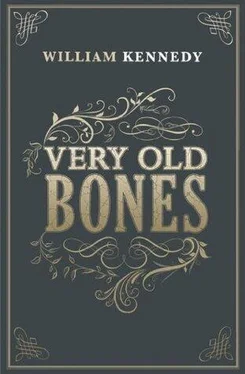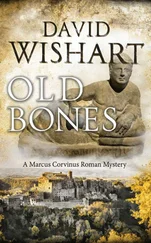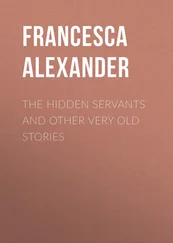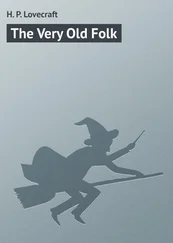Molly followed me down the steps, more surefooted than I, more used to the stairs’ rickety incline. Some light from the kitchen shone through the open trapdoor, and so we could see each other dimly. She looked back up to the light.
“Imagine me holding the box with the baby, and finding my way with a flashlight because I didn’t dare put on the kitchen light, and then coming down those stairs in my condition. I don’t know how I did it.”
“You’re a strong-minded woman.”
“Not strong-minded enough.”
She took the flashlight from me and shone its beam into the area behind the stairs. Three more boxes of jars, a box of tools, a crank for an old automobile, a box of horseshoes, a few lengths of pipe, rusty plumbing fixtures, and a backless chair occupied the space. Molly shone the light onto the horseshoes.
“That’s the spot,” she said, and she reached into the coal bin, lifted a spade off a nail, and handed it to me. I moved the horseshoes and began to dig. It was a shallow grave. I struck the box on the spade’s third thrust.
“Is it just one box, nothing else?”
“It was wrapped in a towel.”
I scraped dirt away, exposing the box and small, decayed fragments of cloth no longer recognizable as anything in particular.
“No towel here any more,” I said.
The light disappeared from the grave and I turned and saw Molly facing away, shining the light on a far wall.
“I need the light, Moll,” I said.
She focused it on the dig but again looked away.
“I don’t want to see it,” she said.
“You won’t have to.”
I raised the box with one end of the spade, then lifted it out with my hand. Only with its touch did the next question arise: What do we do with it? Hallowed ground where? And how? Climb the cemetery fence at night, babe in hand and the spade strapped to my back? But Molly had already thought it through.
“We’ll put the baby in the coffin with Sarah,” she said.
I could only whistle my admiration at the tidiness of this.
“Put the box on her chest and fold her hands over it,” I said, brushing dirt from the box.
Molly took off her apron and handed it to me.
“Wrap the baby in this, and then put the box back in the ground,” she said. “I can’t watch. Bring it up to the kitchen when you finish.” And up the stairs she went.
I spread her apron on the lowest empty shelf and set the box beside it. In close light I saw the box was of a type that locked with a key, and it was locked, or sealed by rust under its eighteen-year-old layer of silt. I found a hammer and chisel in the tool box, easily broke the lock, and raised the top to see the remnants of a cloth of indeterminate type: a muslin pillowcase? a linen blouse? I tipped the box upside down to empty its contents onto the apron, but it would not release, the remains wedded to the interior rust. I did not want to touch anything, more out of sacredness than revulsion or fear of corruption. I nudged the edges of the cloth with the chisel and, as gently as the task demanded that I do this, scraped the swaddling cloth out of its coffin. It was far more intact than the towel, its underside discernible as linen, tanned by time and stained by blood and afterbirth. There was almost no shape to the remains of the child: no torso, no shoulders or rib cage, no limbs, no bones at all that I could see except the half-curve of the tiny skull that raised a doll-like protuberance under the cloth. I would make no inspection of what lay beneath the linen. I folded the apron around it and the odor that arose from the closure was neither of blood nor decayed flesh, but rather a singular emanation more powerful than the fused odors of earth and disintegrating metal: a pungent assault on the senses by the mortal remains of love.
In the kitchen Molly had prepared the burial packaging: a length of brown wrapping paper, a roll of Scotch tape and another of adhesive tape, and a white linen napkin with the scrolled letter P on one corner. I took the remains out of the apron and put them in the wrapping paper, this movement revealing that there remained nothing but human dust and the fraction of skull, and I wrapped and sealed this completely with the tape. I wrapped it then within the napkin, exposing the letter P, and wrapped that twice around with adhesive tape. The entire package was about the size of a poppyseed roll from the Grand Lunch, and when I finished with it Molly took a small purse from the top of the refrigerator, put the remains inside it, and handed it to me.
“You decide where to put it,” she said.
The logical place was under Sarah’s head. I raised the head cushion, and Sarah as well, and fitted the purse snugly into the space. The change in Sarah’s angle of supinity was negligible.
“Do you think people will be able to smell anything?” Molly asked.
“Your flowers should take care of that. Isn’t that why you ordered them?”
“It is.”
“You’ve thought about this a long time.”
“For years. I knew I’d send Walter along with whoever went next in the family. I prayed I wouldn’t go first.”
“What do you think Sarah would say if she knew she was having company in her coffin?”
“She’d find fault. She found fault with everything.”
“It gives a new meaning to ‘virgin with child.’ “
“We all would’ve been happier if Sarah wasn’t a virgin.”
“You really think that would have made a difference?”
“Virgins think about heaven,” Molly said. “They don’t care about what goes on down here.”
Our neighborhood was in a stage of vanishing tradition, dying to its old self, an influx of Negroes creating a new world order, displacing the old Irish and Germans in the same way those two groups had displaced the Dutch and English gentry who so shortsightedly thought that bucolic Arbor Hill was to be their private garden forever. And so for this reason, and also because of the all-but-cloistered life Sarah had led, fewer people came to her wake than were expected, the most notable absence being Chick, who did not even telephone after he received Molly’s telegram, but merely sent a modest basket of flowers, the card with them bearing nothing other than the names Chick and Evelyn Phelan , the first announcement to the family that Chick had married, and simultaneously an act of distancing Molly took to be spiteful.
“Chick will regret this to his dying day,” Peter said when he read the card, “not because of Sarah, but because he’ll eventually realize what we think of his gesture. Anger makes people stupid.”
Anger did not make Peter stupid. And surely it was at least anger, perhaps even rage at the power of an abstraction as cruel, remote, and inviolate as God, but not God, that propelled Peter toward his masterworks. He saw, in the story of Malachi and Lizzie, and then in the way that Kathryn and Sarah had nursed that story and secretly kept it alive, a pattern that need not have been — a wrong to two generations that might have been preventable, if only. .
I’ve generalized about cause and effect in this family, but one proximate cause of what made Kathryn, Sarah, Peter, and the rest of us behave in such diverse but consistent ways was chronicled in that newspaper story Molly saw Sarah reading by candlelight. Molly found the cache of old papers in a crawlspace that opened off the closet of Sarah’s room (Kathryn’s and Michael’s room before Sarah took it over) into an unusable area of the attic. As children, Molly and Julia had discovered the crawlspace and hidden in it to elude Sarah, or merely to exist in a secret place no one else could enter; but Sarah caught them coming out of it one day and the secret place lost all value.
Molly found the papers in the small brown leather suitcase Michael Phelan had used when his work on the railroad required him to stay overnight in another city. There were a dozen newspapers in all, telling day by day the story of Malachi and Lizzie, the marriage destined for enshrinement in a lower circle of hell.
Читать дальше












